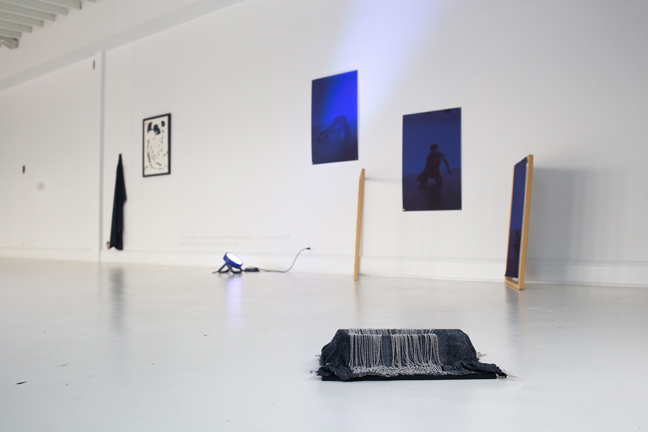“Bodies are shaped by the spaces they emerge from. Space is structural, ideological, imagined and actively made. To recognise space as such is to understand our bodies as always already political sites for comprehending the conditions of a given moment. Our bodies are defined by, and in turn define, the worlds we inhabit. It is with this understanding that Ricki Dwyer, John Alleyne and Zachary Nicol start their conversation in Outmoded Shapes.
Loosely woven out of a series of Zoom calls over the past 7 months, the exhibition is contextualized by 4 key texts*. They are the anchors in the show’s dialogue, orienting and giving shape to the work without defining the way it should be engaged with. A passage about the feminine power of the erotic from Audre Lorde opens out onto Gordon Hall’s discussion on materializing bodies through ritual. bell hooks reminds us that masculinity is learned and practiced just as Mlondolozi Zondi analyzes the aesthetics of afro-pessimism in Black performance. This symphony of ideas sounds the space between Zach, Ricki and John. They have listened to one another and in so doing begun to make sense of the shapes they are each grappling with – gender, class, race, masculinity, performance, identity. They make visible for one another the forms that they feel bound by and against which they are pushing.
The polyvalent readings of the body charge the exhibition with a fluidity that refuses any fixed understanding of what a body is. Instead all three artists ask how bodies are made. They ask what constitutes the materiality of a body, and what role we play in bringing that materiality into existence. They ask how a body can refuse legibility and capture while being used as a medium for imagining space otherwise. They look at how we weave understandings of self out of images made by others and how they can be broken down to make new, loose, freer assemblages.
These questions are grounded in the specificity of each artist’s concerns. For Ricki there is a commitment to interrogating the way labor exploitation has created a relationship to materiality that shapes persistent forms of racial and economic domination. For John there is a blossoming refusal of, and desire to better understand, how patriarchal ideals have built a rigid and limiting container for (Black) masculinity and manhood. And for Zach, there is the desire to explore the (im)possibility held in/by the contradiction of Black bodies, examining the conditions of spaces that are defined by the violent regimes of an anti-black gaze.
In all of these instances there is a recognition that we are living on in what Aliyyah I. Abdur-Rahman describes (via Mlondolozi Zondi) as “outmoded shapes” – bodies bound up in structures that presuppose them incapable of change. And it follows that if our bodies cannot change then neither can the systems of dominance that organize those very same bodies into ideological and material frameworks. Leaning into the words and ideas of Zondi, Lorde, Hall and hooks, Zach, Ricki and John push back, arguing with a quiet and considered force that while we live on in the decay of shapes built around violence, they are not fixed and we have at our disposal the languages to unveil and rupture them. In doing so, Outmoded Shapes offers a mutable, fluid and polyvalent reading of the body that is the precondition for the exposure or foreclosure of “different ways of living, being and loving.”
Exhibition Text written by Rohan Ayinde
Read more about the artists, John Alleyne, Ricki Dwyer, and Zachary Nicol,
